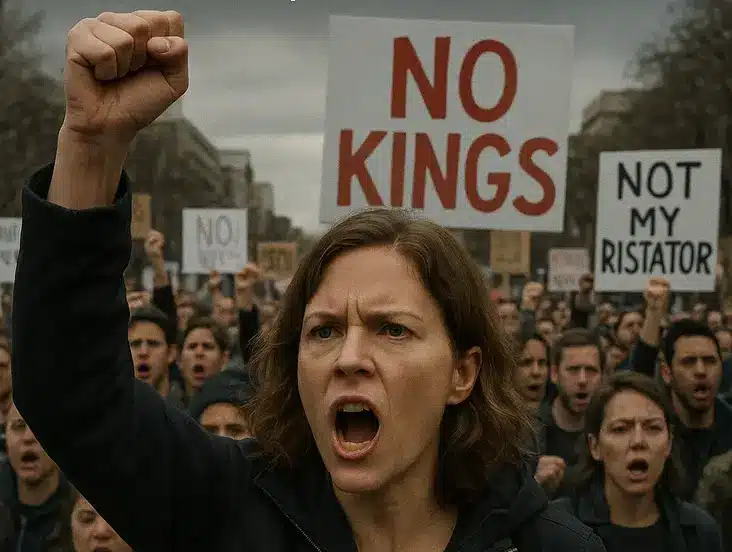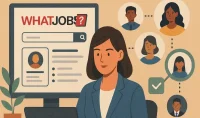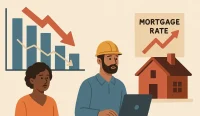In a significant development for political activism in America, nearly 2,000 protests are expected to take place across the country this Saturday in what organizers are calling the “No Kings” protests. These coordinated demonstrations are specifically organized to speak out against President Donald Trump and what protesters describe as “authoritarian actions.” The timing is particularly symbolic, as the protests will occur on June 14th—coinciding with both the U.S. Army’s 250th birthday and President Trump’s 79th birthday.
The protests come amid ongoing unrest in Los Angeles, where Homeland Security Secretary Kristi Noem has confirmed that immigration raids will move forward despite mounting protests and legal challenges. This decision has only fueled the determination of protesters nationwide who are concerned about civil liberties and presidential powers.
Table of Contents
Detroit Becomes a Key Protest Hub
One of the major “No Kings” protests will take place at Clark Park in Detroit’s Southwest neighborhood, where organizers have reported that more than 2,000 people have already registered to attend. The demonstration is scheduled to begin at 1:00 PM on Saturday, with similar protests planned for numerous other Michigan cities including Ann Arbor, Ferndale, Novi, and Farmington Hills.
The Message Behind “No Kings”
Audrey Bore Yard, one of the Detroit protest organizers, explains that the core message is clear: “America has no kings, and no president can take away the right to protest.” This sentiment reflects growing concerns among demonstrators about perceived threats to constitutional rights, particularly in light of recent events in Los Angeles where National Guard troops have been deployed in response to immigration protests.
“As far as I’m concerned, I have the right to free speech and the right of assembly,” Bore Yard stated, “and what we’re seeing in Los Angeles is those two rights being taken away.”
Constitutional Rights vs. Presidential Authority: The Legal Debate
The Right to Peaceful Assembly
The First Amendment to the U.S. Constitution explicitly protects “the right of the people peaceably to assemble, and to petition the Government for a redress of grievances.” This fundamental right has been a cornerstone of American democracy since the nation’s founding, allowing citizens to express dissent and advocate for change through public demonstrations.
Elder Leslie Matthews, another organizer of the Detroit protest, emphasized that their preparations have focused on ensuring safety and maintaining peace. “That looks like us saying how do we keep one another safe? How are we going to do this protest? Because this is rooted and grounded in peacefulness,” Matthews explained.
Learn more about First Amendment protections from the ACLU
Presidential Powers and National Guard Deployment
On the other side of the debate, former Michigan State Representative Rocky Raczkowski argues that President Trump was within his constitutional rights to deploy National Guard troops to Los Angeles. “The president has the right under the Constitution and under the United States Code—people could look it up—to invoke and authorize or federalize the National Guard to put down any type of riots or to protect federal agents if the local community is not willing to do so,” Raczkowski stated.
He further clarified his position on protests: “I’m all in favor of peaceful protests. When you make those protests violent or you harm persons or property, it’s over.”
The Chilling Effect on Free Speech
Wayne State Professor Mark Side, who has extensively researched free speech issues, offers a nuanced perspective on the situation. While acknowledging that the president’s decision to send National Guard troops to protests is not illegal, Side points out that such actions may have a “chilling effect” on citizens exercising their constitutional rights.
“The idea is if you’re thinking about going to a protest, but you know the National Guard has been sent in and is on the ready, it may make you less likely to show up or it may change what signs you bring,” Side explained.
✊ Explore Public Policy & Activism Careers on WhatJobs
Movements like the “No Kings” protests are reshaping America’s political landscape.
Discover meaningful careers in Political Organizing, Human Rights Advocacy, Nonprofit Leadership, and Government Affairs—roles where your voice can drive real change.
WhatJobs connects you with in-demand opportunities in social justice, policy research, and civic action that align with your values and passion.
👉 Browse public service and advocacy jobs now — and be part of the movement for democracy.The Nationwide Impact of “No Kings” Protests
Geographic Scope and Organization
The “No Kings” protests represent one of the most widespread coordinated political demonstrations in recent American history. With nearly 2,000 protests planned across the country, virtually every major city and many smaller communities will see demonstrations. This level of organization demonstrates the power of modern social media and digital communication in facilitating large-scale political mobilization.
Historical Context of Presidential Protests
Protests against sitting presidents have a long history in American politics, from the Whiskey Rebellion during George Washington’s administration to the anti-Vietnam War protests during Lyndon Johnson’s and Richard Nixon’s presidencies. The “No Kings” protests continue this tradition of citizens publicly expressing dissent against executive policies and decisions.
Media Coverage and Public Perception
How these protests are covered by media outlets and perceived by the general public will likely have significant implications for both the protest movement and the administration’s response. Research has shown that media framing of protests can significantly influence public opinion about both the demonstrators and the issues they champion.
Preparing for the Protests: Safety and Legal Considerations
Know Your Rights as a Protester
If you’re planning to participate in the “No Kings” protests, it’s essential to understand your legal rights and responsibilities:
- You have the right to peacefully assemble in public spaces
- You have the right to photograph or record anything in plain view, including police officers
- You do not need a permit to march on sidewalks or public parks, as long as you don’t obstruct traffic
- If you’re stopped by police, you have the right to remain silent and ask for an attorney
Safety Precautions for Demonstrators
Protest organizers across the country are emphasizing safety measures for all participants:
- Attend with a buddy or small group
- Wear comfortable shoes and weather-appropriate clothing
- Bring water, snacks, and any necessary medications
- Write emergency contact information on your arm
- Follow the guidance of designated protest marshals
- Have a plan for where to meet if separated from your group
The Future of Political Protest in America
Digital Activism and Physical Demonstrations
While in-person protests like the “No Kings” demonstrations remain powerful tools for political expression, digital activism continues to grow in importance. Social media campaigns, online petitions, and virtual rallies complement traditional protests, allowing for broader participation and amplifying messages beyond geographic boundaries.
Building Sustainable Movements
For protest movements to create lasting change, they must evolve beyond single events into sustained campaigns. Successful movements throughout history have combined visible public demonstrations with ongoing community organizing, voter registration drives, and targeted political advocacy.
Bridging Political Divides
In an increasingly polarized political landscape, protest movements face the challenge of communicating effectively across ideological divides. Finding common ground on core democratic principles—such as the right to peaceful assembly and free expression—may offer opportunities for dialogue even amid deep disagreements on policy issues.
FAQ: No Kings Protests Nationwide
What are the No Kings protests and why are they happening?
The No Kings protests are a nationwide series of demonstrations organized to speak out against President Donald Trump and what organizers describe as authoritarian actions. The protests are happening in response to concerns about civil liberties, particularly following the deployment of National Guard troops to Los Angeles during immigration protests. With nearly 2,000 No Kings protests planned across America, organizers aim to assert that “America has no kings” and defend constitutional rights to free speech and assembly.
When and where are the No Kings protests taking place?
The No Kings protests are scheduled for Saturday, June 14th—coincidentally President Trump’s 79th birthday and the U.S. Army’s 250th birthday. In Michigan alone, protests are planned for Detroit, Ann Arbor, Ferndale, Novi, Farmington Hills, and many other cities. The Detroit protest will be held at Clark Park in the Southwest neighborhood starting at 1:00 PM, with over 2,000 people already registered to attend. A comprehensive list of No Kings protests nationwide can be found on organizers’ websites.
Are the No Kings protests legal, and what rights do protesters have?
The No Kings protests are legal exercises of First Amendment rights to free speech and peaceful assembly. Protesters have the constitutional right to gather in public spaces to express political opinions. According to Wayne State Professor Mark Side, while the president’s deployment of National Guard troops is technically legal, such actions may discourage some people from exercising their free speech rights. Protesters should know they have the right to peacefully demonstrate, photograph public events, and remain silent if questioned by authorities.
How are authorities responding to the No Kings protests?
Authorities’ responses to the No Kings protests vary by location. In Los Angeles, where immigration protests have already occurred, Homeland Security Secretary Kristi Noem has confirmed that immigration raids will continue despite protests, and National Guard troops have been deployed. Former Michigan State Representative Rocky Raczkowski defends the president’s authority to use the National Guard “to put down any type of riots or to protect federal agents if the local community is not willing to do so,” while emphasizing support for peaceful protests only.




